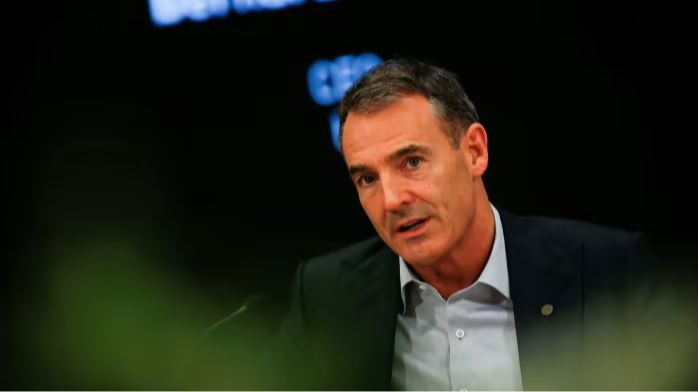Receive free UK companies updates
We’ll send you a myFT Daily Digest email rounding up the latest UK companies news every morning.
Good morning. We have a scoop today on BP chief executive Bernard Looney, who has resigned after admitting he had failed to disclose the extent of past personal relationships with colleagues.
Looney, 53, is to be replaced by Murray Auchincloss, the oil major’s chief financial officer, “on an interim basis,” the company said in a statement on Tuesday.
Looney had told the company earlier on Tuesday that “he was not fully transparent in his previous disclosures”, BP said. “He did not provide details of all relationships and accepts he was obliged to make more complete disclosure.” Read the full story on Looney’s departure, which is set to rock the 113-year-old energy group.
-
More energy news: The world is at “the beginning of the end” of the fossil fuel era, according to the leading global energy watchdog, which for the first time has forecast that demand for oil, natural gas and coal will all peak before 2030.
Here’s what else I’m keeping tabs on today:
-
Economic data: The US releases its consumer price index for September, the UK publishes its revised July GDP figure and the EU has its monthly industrial production figures. The International Energy Agency issues its monthly Oil Market Report.
-
IPO: UK-based chip designer Arm is expected to announce the final pricing of its initial public offering, the biggest in nearly two years.
FT subscribers: Join our webinar today (12:30 — 13:30 GMT +1) on China’s economic slowdown. Register for free and send in your questions for James Kynge, Yuan Yang, Eleanor Olcott, Yu Sun, and UBS economist Tao Wang.
Five more top stories
1. North Korean leader Kim Jong Un arrived in Russia on his private train on Tuesday for a meeting with Russian president Vladimir Putin “in the coming days”. The visit marks Kim’s first foreign trip since the Covid-19 pandemic and could result in an arms deal to support Moscow’s war in Ukraine. Here’s what analysts expect from the meeting.
2. China’s navy has launched its largest-ever exercises with an aircraft carrier in the western Pacific. The Shandong, the People’s Liberation Army Navy’s second aircraft carrier, was on course on Tuesday to converge with more than 20 other Chinese warships in waters between Taiwan, the Philippines and the US Pacific territory of Guam. “They are expressing their displeasure with the various military exercises that have been under way in their periphery,” said one analyst.
-
China’s property woes: The ailing sector has emerged as the biggest threat to the stability of the global economy, fuelling a “dramatic shift” out of emerging market stocks and into the US, according to a closely watched investor survey.
-
Chinese diplomacy: Xi Jinping’s absence from the G20 summit left many wondering whether China’s leader would opt out of future summits, thereby reducing Beijing’s influence in international diplomacy.
3. Rescue workers recovered hundreds of bodies from eastern Libya after devastating floods destroyed large parts of the coastal city of Derna. Tamer Ramadan, head of the International Federation of Red Cross and Red Crescent Societies delegation to Libya, said on Tuesday that 10,000 people were thought to be missing. “The death toll is huge,” Ramadan told the FT. “I believe the total number will hit some thousands.” Read the full story.
4. Apple has unveiled four new iPhone models and two updated Watches, as it tries to tempt consumers in an economy where people are holding on to their devices for longer. Pricing for the new iPhone 15 Pro Max models will start at $1,199 — $100 more than a year ago — reflecting Apple’s strategy of making up for stagnant unit sales with higher average selling prices. Our report from the launch has more details.
5. Exclusive: Rishi Sunak learnt of the arrest of a parliamentary researcher accused of spying for China shortly after the event in March, but still pressed ahead with stepping up engagement with Beijing. Sunak has embarked on a new approach to China and the UK government labelled the country an “epoch-defining challenge” rather than a “threat” in a defence review. Here’s more on the fallout from the spy scandal.
Visual story
Over the past few years, we have taken a big leap forward in our decades-long quest to build intelligent machines: the advent of the large language model, or LLM. As generative artificial intelligence is rapidly woven into our lives, understanding the technology behind it means understanding why these models are such versatile cognitive engines — and what else they can help create. This visual story shows how it works.
We’re also reading . . .
Chart of the day
China is set to eclipse Japan as the world’s largest exporter of cars. But the impressive export data hides a domestic market where demand has peaked for traditional combustion engines and consumers are buying far fewer cars, leading to “massive overcapacity” in the number of vehicles produced in factories across the country.
Take a break from the news
Lake Khovsgol is located in one of the most remote regions of Mongolia and is roughly 136km long. At -12C, it might seem like the last place you would want to visit. Not so for Tim Moore, who participated in the Mongol 100 bike race, pledging to traverse the frozen lake “by any means necessary”.
Additional contributions from Grace Ramos and David Hindley
Read the full article here

